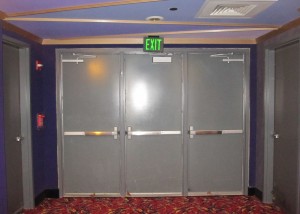 As I read about the terrible movie theater tragedy in Aurora, Colorado, I thought about things from a door hardware consultant’s perspective. Could future tragedies be prevented by changing the way we think about the hardware on movie theater exits? Because the suspect allegedly propped open the exit door so he could return during the movie with guns, explosive chemicals, and a protective vest, would monitoring or alarming the emergency exit have thwarted his attack?
As I read about the terrible movie theater tragedy in Aurora, Colorado, I thought about things from a door hardware consultant’s perspective. Could future tragedies be prevented by changing the way we think about the hardware on movie theater exits? Because the suspect allegedly propped open the exit door so he could return during the movie with guns, explosive chemicals, and a protective vest, would monitoring or alarming the emergency exit have thwarted his attack?
There has been a lot of discussion about this issue in the past two weeks (here’s a link to one article). Many say that he would have found another way to carry out his plans, and maybe they’re right. He may have targeted moviegoers in the lobby instead of the theater, or he may have found another way to get into the theater with his weapons. We will probably never know.
I read an article this morning about the lack of security guards in the Aurora theater during the first screening of “The Dark Knight Rises,” which was expected to attract a large crowd. Will we see more security personnel in theaters going forward? What recommendations should the door and hardware / security industry make to help provide the necessary level of security for theaters? Delayed egress locks would not be allowed by the International Building Code for theaters, since their use is prohibited by the IBC on Assembly occupancies, however, delayed egress locks are allowed on emergency exits by NFPA 101 – The Life Safety Code. Exit alarms are code-compliant, but would they interfere with the function of these doors, which are sometimes used for regular egress at the end of a movie? Is remote monitoring via door position switches and cameras a good solution? Is exit-only hardware sufficient?
What will you say when someone asks for advice on security for your local theater?
You need to login or register to bookmark/favorite this content.

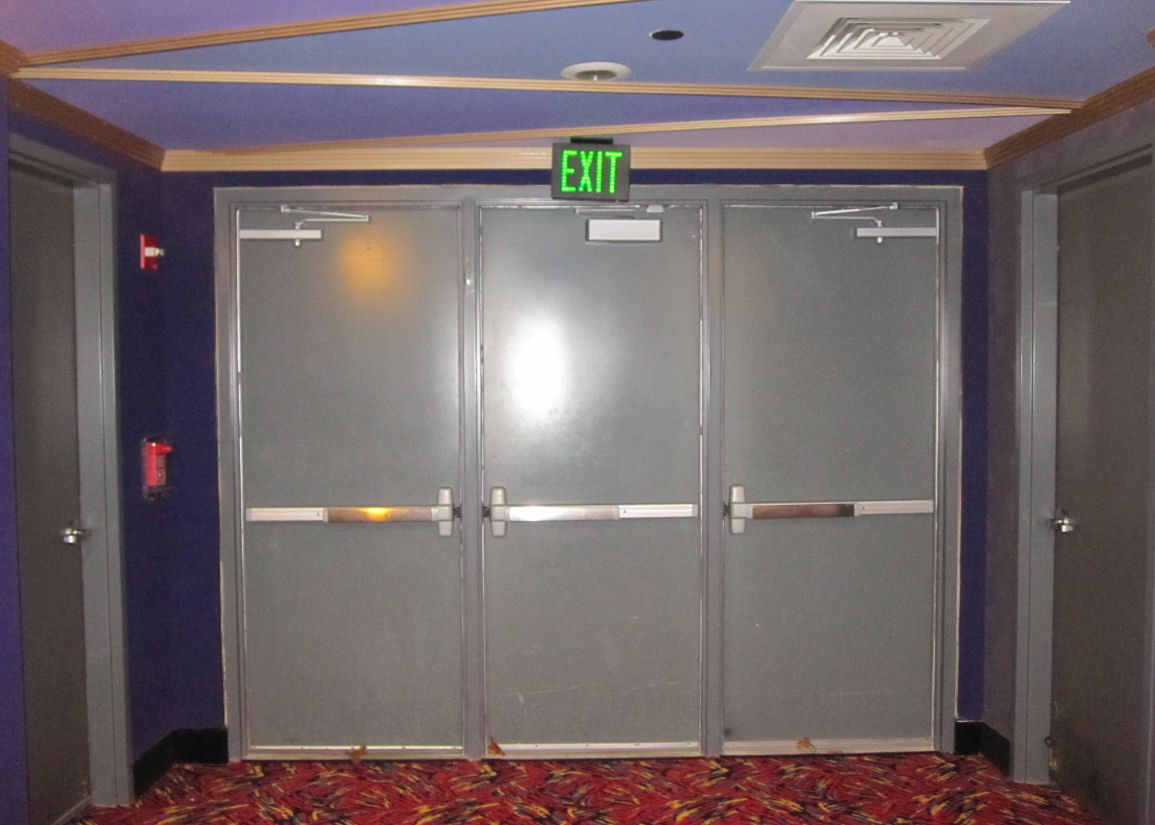
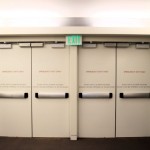
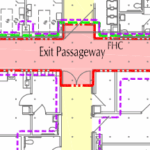
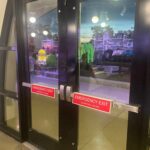

Here is an excerpt from a product suggestion I recently made to one of the major exit alarm manufacturers:
It is common practice in movie theaters to allow egress through the emergency exits to clear the auditorium rapidly after a show has ended. Typically these exits have standard panic devices.
An exit alarm or alarmed exit device which could be remotely disabled would allow this procedure to continue while still preventing the casual opening of these doors at other times. When the picture has ended, an usher or the projectionist could temporarily disable the alarm(s) to allow egress and it would then be either manually or automatically rearmed when the premises was fully emptied. Multiple devices in the same auditorium could be coded alike so that a single remote would operate them all. This would also prevent patrons from admitting persons who did not pay admission.
Just as the Columbine massacre spawned the classroom intruder function lockset, this senseless tragedy is likely to create a new generation of exit alarms.
Thanks Peter! I’m kind of surprised that theaters had not already incorporated some sort of monitoring to prevent unauthorized access to a free movie.
A latch bolt monitoring switch connected to some type of lighting would probably be the most practical solution. A door position switch would only let you know if the door was blocked open. Someone could dog the hardware or block a latchbolt to gain access from the exterior. The lighting should be visible from a distance and made to be tamper proof.
Not the only solution but would be economical.
Long time reader, first time poster,love the site!
Thanks.
Keep up the good work.
Jim Stroda
COMPLETE DOOR & LOCK
Thanks Jim! I’m glad you love the site!
Most of the larger theaters that I have been in recently will let patrons exit through a bank of exit only doors. Typically, you have some theater personnel standing there to make sure that you do not exit one theater and simply walk into another one. You could easily install surface mounted door position switches above these doors to work as a “prop” alarm. A visual indicator can then be used to signal these personnel that doors are either secure or if someone has propped one of them open. I cannot see that a loud alarm would be necessary and personally think any type of delayed egress at these doors is too much. If new doors are being installed, use a latch position switch instead of the door position switch to ensure proper latching.
Most theaters will have an emergency exit in them, these you would definitely want to alarm somehow with the signage stating so.
I agree on the delayed egress. It could do more harm than good. Signage and a visual indicator should be enough. Should there be a remote panel for monitoring the door position, or just the local indicator?
Good question. The exit alarms are a terrific idea, low cost and easy to retrofit.
The concept of video monitoring will be offered up, but is rarely successful. It is just too reliant on the human monitoring to do a job that humans are ill equipped to do.
Video tied to analytics that then sound an alarm could work.
Any alternative that engages the audience to do the right thing would be the ideal solution.
Suggest having lights wired to go on when the doors are open. At the start of the performance is when people are most interested in seeing the movie. If a door is opened or propped, lights are on and alarm is sounding, the crowd works to make sure that does not continue.
AHJ’s love this idea as well. The theatre empties faster when it is well lit.
I agree Glenn, when you have traditional video monitoring, you need a body to watch the monitor. Plus that’s a big investment in hardware and camera equipment.
How about an exit alarm that could be switched on automatically when the house lights are turned off?
The alarm would sound if any of the exit doors were opened while the movie is running, but would remain silent when the doors are used for normal egress after the show.
Hi Chuck –
I’m on the fence about the audible alarm. I think the signage would be enough to keep most people from opening the doors during the movie, but if someone left a little early or disregarded the signage, the audible alarm might startle the theater patrons and would definitely ruin the remainder of the movie. Also, the monitor would have to be disabled only right after the movie ended, not the whole time that the house lights are on. On the other hand, having just a local light and not an audible alarm would mean that theater staff would have to physically see the light on and investigate.
I’m still thinking about this one.
I’m on the fence about the audible alarm as well. I think the lights would be enough to keep most people from opening the doors during the movie and work for security but would there have to be a timer on the lights? Than just having just a local light would mean that theater staff would have to see the light on and investigate but than it would let people know if there is an issue at the door. If an alarm is needed than have it on the power to the lights so that is audible for security or use a remote alarm station at the ticket booth if door is opened.
I’m not real wild about the alarm either, it’s just that I don’t think the theater staff (mostly teenagers) could (or should) be entrusted with the safety/security of the patrons.
I’m leaning towards something that does not require a lot of responsibility from the staff.
I know most chain grocery stores monitor the side doors for open position
As stated already, silent alarming the door sounds like good idea, and does rely on the human factor.
Mankind will event different ways to carry out evil unfortunately.
Can you design for it, yes but so many scenarios that like other places try to protect for, you are going to wind up with a prison
It is my personal opinion that remote monitoring at a location where someone is always in attendance should be done, depending on an analysis of the risks. If the exit opens directly outside from the audience area, it is pretty obvious to the whole audience that someone is doing something they should not be doing. In theaters I have visited, curtains cover the actual exit with a lighted exit sign over the opening. The area behind the curtain and screen has been used to store things used in theater operation as well as a path to the outside. Most of the large complexes I have been in have the audience exit the direction they came in with long corridors located stratigically aimed at the parking lots. Hidden, accessible doors should have some form of monitoring or camera coverage if for no other reason than having someone allow friends to sneak in without paying.
The time that we want to keep people from unauthorized use of the door is at the beginning of the show. That’s when a paying customer will go to the door an let their non-paying friends in. And the house lights are still on. So linking the monitor to the lights doesn’t necessarily work. The lights came on at the end of the last show.
Several theaters that I’ve been in require exiting thru these doors (direct to outside) to prevent “multi-viewers” – no reentry to the lobby after the show. Bit of a problem if you or the kids had one of those “hot tub size” sodas.
Not that it relates but Exit Only hardware seems like a good idea.